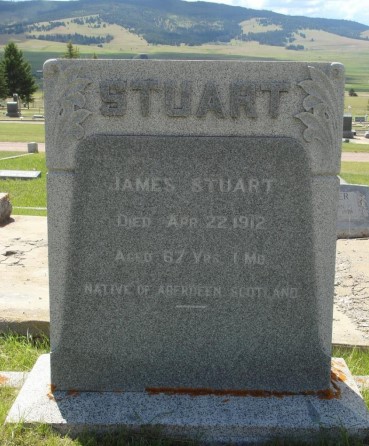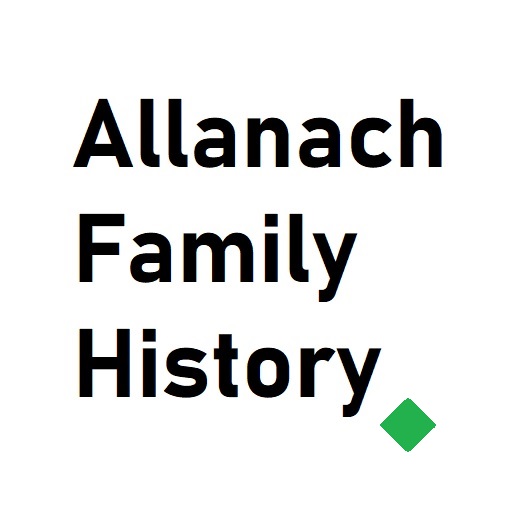Introduction
Clan affiliation was probably like supporting a football team in previous days; you chose the name of the Laird you had pledged allegiance to. But like fair-weather supporters, if your chosen Laird was failing on the (battle)field, some less loyal members might have quickly switched sides, and with it their name!
That being said, clan affiliation did have importance and in 1745, it is likely that at least one Allanach would have come out in Rebellion and taken up arms in allegiance to the local clan chief.
It is also clear that the name Stuart/ Stewart has had particular importance to Allanachs over the years. Whether that means affiliation to Clan Stewart is up for debate, and several other Clans, chiefly Grant and MacFarlane claim Allanachs. Indeed, for such a small family from such a relatively small area, it is surpirsing that so many clans claim our family!
Stewart
Stewart or Stuart crops up again and again in the Allanach records. A good example of this might be the case of George Allanach, who attested to using both Stuart and Allanach names in 1855, as a consequence of the 1745 rebellion.
There is no clear cut-off point as to when Allanach was used and when Stuart took over, indeed there seems to have been more Allanachs in Strathdon parish before Culloden than the century after it. So there is no clear evidence that Allanach was being used to disguise the Stuart name. Indeed the 2 names appear to have been interchangeable before Culloden, and after it.
One answer might be prestige. This newspaper article confirms that when one Allanach was conferred a title, he became a Stewart, ‘Duncan Stewart of Carnavern’. 1873 – Newspaper article linking allanachs to Stewarts
Later Allanachs became Stuarts through choice. My own great great Grandfather, James Paull Allanach, changed his name to James Stuart when he fled to Montana.

I have contacted the Stuart society to enquire if they have any records on the link, but so far without success. ‘Allanach’ is not listed on their website as an affiliated name or Sept but I do feel there is more to explore here and there must have been a compelling reason why so many Allanachs in the past changed their name to Stuart/ Stewart or used Stuart as an alias.
Grant
The Grant connection through Sir Thomas Randolph of Strathdon is explored by the Clan Grant’s chief historian in this Grant – Clan Allan document.
”Sir Thomas Randolph, 1st Earl of Moray, the son of Thomas Randolph of Strathdon, was
also called “Chief of Clanallan” in a history of the Cumming and Bruce families. Sir Thomas
served as Regent of Scotland from 1329 until his death at the Battle of Dupplin Moor in 1332,
while figting against the forces of John Balliol. (Family Records of the Bruces and Cumyns, by
Mary Elizabeth Cumming Bruce, London, 1870, p. 450).
also called “Chief of Clanallan” in a history of the Cumming and Bruce families. Sir Thomas
served as Regent of Scotland from 1329 until his death at the Battle of Dupplin Moor in 1332,
while figting against the forces of John Balliol. (Family Records of the Bruces and Cumyns, by
Mary Elizabeth Cumming Bruce, London, 1870, p. 450).
Although Sir Thomas Randolph’s clansmen would not have used surnames per se in the
13th century, they apparently assumed the names Stewart (Steuart) and Allanach with the passage
of time. These names were widely used in Glenochtie, Glenkindle and Glenbucket, in Strathdon,
and in the neighboring glens of Livet and Stratha’en in the country of the Grants.”
13th century, they apparently assumed the names Stewart (Steuart) and Allanach with the passage
of time. These names were widely used in Glenochtie, Glenkindle and Glenbucket, in Strathdon,
and in the neighboring glens of Livet and Stratha’en in the country of the Grants.”
Clan Grant does not list Allanach as an official sept of the Clan name and the above source is the only one I can find to link the two names.
Macfarlane
A ‘History of the Clan MacFarlane by J MacFarlane in 1922 claims that the Allanachs (Na h-Allanaich in modern Gaelic) are ‘sprung’ fom the MacFarlanes :
The following from The Weekly Scotsman, by Mac-an-t-Sionnaich,” gives a a summary of the
ramifications of the name :
“The Allans are a branch of a large Scottish family group, the MacAllans or Allans. The chief Highland
branches were those of Aberdeenshire, Bute, Caithness, Dumbarton, Perth, and Ross.
“The name in Gaelic, Ailean, is derived from the early Irish Ailene, Adamnan’s Ailenus.
“There were 11,578 Allans in Scotland in 1861. “There are many forms of the Clan name-Allan,
Allanach, Allanson, Alison, Allison, Callan, Callen, Callanach, MacAllan, MacAllen, and MacCallan. The
Callans are a Bute family; the Allanachs belong to the Aberdeen Highlands and Strathspey; Callanach is an uncommon Appin form, while some Callens live at Dunoon. The Allansons and Allisons belong to the
Lowlands, but they are no doubt of Highland or Celtic origin.
According to tradition, the Clan Allan of Donside fought the Coutts, and were victors, at an early period.
The MacAllans of Mar and Strathdon are descended from Allan MacFarlane, younger son of one of the
Lairds of MacFarlane, who settled in Strathdon many centuries ago.
His descendants were known MacAllans, Allanich, or Clan Allan. Some of these MacAllans are alluded to by Nisbet (System of Heraldry) as of Lismurdie, Auchorrachan, Balnagown, Kirkton, and Markinch, etc.
“We find that The ancestor of the MacFarlanes of Kirkton (Stirling) was George MacFarlane, of Markinch
(Fife), second son to Andrew MacFarlane of that ilk, in the reign of James V. (See Chapter XXXII.).
George, having sold the foresaid lands of Markinch, settled eventually in the north Highlands among his
namesakes, the MacFarlanes, promiscuously called in the Irish (Gaelic) language M’Allans, Allanich, or Clan Allan, because of this descent from Allan MacFarlane.
From him (George) are descended the families of Auchorrachan, Balnagown, and Lismurdie, etc., as also
several others in Braemar and Strathspey.
His posterity continued in the North for several generations, until the time of Patrick MacFarlane, the fourth descendant in a direct line, who, returning again to the South, purchased the lands of Kirkton (Stirling) (History of Stirlingshire, v. 2, p. 100-1.). James M’Allane, in Dellaborar, Braemar, was prosecuted for remaining at the horn, 1619 (R. of P.C.). John Allan, in Delmucklachlie (Mar) was a resetter of outlawed MacGregors, 1636. “The Allanachs of Strathdon are also apparently sprung from the MacFarlanes, Na Allanich, Finlay Allenoch was a tenant in the lands of Innernete (Towie) in 1588. William Allanach, in Glenmuick, was prosecuted for resetting outlawed MacGregors, in 1636. There were Allanachs in Torrnonich, in 1660. William Allanach, in Cattie, near Birse, 1671. Allanachs in Muchrach, Strathspey, 1719. There were four Allanachs in the Strathdon Volunteers in 1798, including Sergt. Duncan Allanach. In 1903, there were two families in Glenbuchat, one at Torranceroy, and one at Upperton. They are still to be found in Strathdon and Tarland.
